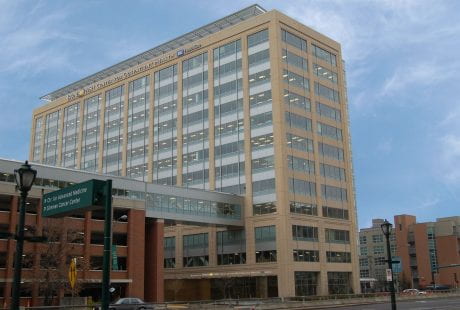Observational studies and therapeutic trials are vital to ALS research. By learning more about the disease and our patients, we can advance the investigation of future treatments.
What study is right for you?
Contact us at (1-844) ALS-Care or ALS@wustl.edu.

Observational Studies
DNA Repository
This project will collect one blood sample from which your DNA is extracted and banked in our DNA database. The database enables researchers to perform research into the genetic causes of ALS.
Principal Investigators: Timothy Miller, MD, PhD
Participants: Open to patients with ALS and healthy controls
Contact Information:
Phone: (1-844) ALS-Care
ALS@wustl.edu
Target ALS Longitudinal Biofluid Study
This study will collect a wide range of samples, clinical information, and at-home measurements for future ALS and neurologic disease research. Samples such as blood, cerebral spinal fluid (CSF), and urine will be collected over a period of 12 to 16 months from both healthy volunteers and ALS participants, respectively. All samples collected will be stored in a central repository and made available to the wider research community in an effort to identify biomarkers and treatment targets for ALS. Participants will also undergo speech and breathing measurements at home via an app on a smartphone or tablet.
Principal Investigators: Timothy Miller, MD, PhD
Participants: Open to patients with ALS, pre-symptomatic ALS gene carriers, and healthy volunteers
Contact Information:
Phone: (1-844) ALS-Care
ALS@wustl.edu
CSF Biomarker Repository
CSF is fluid that bathes the brain and spinal cord and protects them from damage. Since CSF is so closely involved in the nervous system, this fluid provides one of the most useful pictures of changes that occur during neurodegeneration in ALS. This project involves collection of CSF via a lumbar puncture. This procedure takes approximately two hours and can be scheduled at your convenience.
Principal Investigators: Timothy Miller, MD, PhD
Participants: Open to patients with ALS and healthy controls
Contact Information:
Phone: (1-844) ALS-Care
ALS@wustl.edu
The DIALS (Dominant Inherited ALS) Network
This study will provide genetic testing of known ALS causative genes and perform longitudinal evaluations for people with genetic ALS in their family. This study will identify biomarkers and early disease measures of disease onset. Genetic testing can be done without revealing results. Study visits are every 6 months or yearly.
Principal Investigators: Timothy Miller, MD, PhD
Participants: Open to first-degree relatives of patients with dominantly-inherited ALS or FTD
Contact Information:
Phone: (1-844) ALS-Care
ALS@wustl.edu
IMC – Intermuscular Coherence: A Biomarker for Early Diagnosis and Follow Up of ALS
This is an observational study done in conjunction with a clinical EMG to determine whether surface electromyography (sEMG), a method of measuring muscle activity through the skin, is a valid tool to diagnose ALS at an early stage as well as assess the disease progression in future clinical trials. The study, which involves placing electrodes on participants’ arms and legs and then contracting certain muscles, takes approximately one hour to complete.
Principal Investigators: Sean Smith, MD
Participants: Open to patients who are undergoing a clinical EMG
Contact Information:
Phone: (1-844) ALS-Care
ALS@wustl.edu
Therapeutic Trials
HEALEY Platform Trial
This is a Phase 2/3 multi-center, multi-drug clinical trial to evaluate the safety and efficacy of investigational products for the treatments of ALS. Eligible participants will be randomized to one of multiple regimens (or research drugs). Within each arm, each participant will be randomized to either drug or placebo. The treatment will last a maximum of 24-weeks with an optional open label extension. For each drug, study visits which will occur every 4 weeks either in clinic (seven clinic visits) or phone-based. Once a participant has completed a drug, they can be re-randomized back into the study for a different drug.
Principal Investigators: Timothy Miller, MD, PhD
Participants: For patients with all forms of ALS, please contact us to see if you meet criteria
Contact Information:
Phone: (1-844) ALS-Care
ALS@wustl.edu
ATLAS – Phase 3 Trial of Tofersen
ATLAS is a Phase 3 trial of tofersen in pre-symptomatic SOD1 gene carriers. Tofersen is an antisense oligonucleotide (ASO) drug designed to reduce levels of SOD1 protein. Participants initially take part in a natural history run-in period during which a biomarker called neurofilament light chain (NfL) is measured monthly via blood draws either at home or in clinic. If the NfL level reaches a certain threshold, treatment with tofersen/placebo is initiated. Participants who develop ALS during the trial may be eligible to enroll in an open label extension. The trial will enroll approximately 150 participants worldwide.
Principal Investigators: Robert Bucelli, MD, PhD
Learn more: https://alsatlasstudy.com
Participants: Open to adults with a confirmed SOD1 mutation who are pre-symptomatic for ALS
Contact Information:
Phone: (1-844) ALS-Care
ALS@wustl.edu
FUSION (ION363CS1) – Phase 1-3 Trial of ION363
FUSION is a Phase 1-3 trial of ION363. ION363 is an antisense oligonucleotide (ASO) drug in development for patients with a rare genetic form of ALS caused by mutations in the FUS gene. The trial is a global, multi-center study in up to 64 patients. Part one of the trial will consist of patients randomized to receive a multi-dose regimen of ION363 or placebo for 61 weeks, followed by part two, which will be an open-label period in which all patients in the trial will receive ION363 for 85 weeks.
Principal Investigators: Robert Bucelli, MD, PhD
Participants: Open to patients with ALS who carry a FUS genetic mutation
Contact Information:
Phone: (1-844) ALS-Care
ALS@wustl.edu

Center for Outpatient Health
Clinical Translational Research Unit (CTRU)
- Physical Address: 4901 Forest Park Avenue, St. Louis, MO, USA
Located on the 5th floor of the Center for Outpatient Health building.